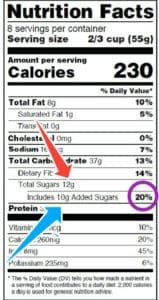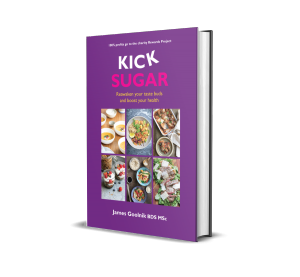25 / 05 / 2023
Kicking The White Stuff – One Dental Nurses Efforts To Go Sugar-free
As I tucked into some moreish sweeties over Christmas I said to my husband “I’m sure they put something addictive in these things!” to which he replied “Like what?! Sugar?”
To some people its obvious – to others, we simply just don’t realise how addictive sugar is!
Sugar plays such a large role in our modern diets, and this has left some of us behaving like sugar “junkies” wondering where our next fix will some from (in my case, the closest bag of Haribos!).
But I wondered if I could break this addictive cycle, and if so, how difficult it would be to kick the cravings…… The health benefits of giving up sugar were made all too aware to me last year when my mum was diagnosed as “pre-diabetic” and had to attend a group which helped her look at her diet and lifestyle. We’ve KNOW that sugar can cause dental health problems as well as general health problems – so why can’t we just “give it up”?
Sugar addiction is no laughing matter, in fact research has shown it is as addictive as cocaine and cigarettes, and humans actually binge on sugar in the same way as hard drugs.
And our nation’s love of sugar comes at a high price too, as the NHS revealed that obesity is now costing the taxpayer £16 billion a year. And admissions to hospital for children aged 5-9 years in 2018 was up to nearly 26,000 patients! Staggering. There is no doubt we are in a “sugar crisis” and it looks as if it’s here to stay.
Cutting out or reducing sugar intake doesn’t come without some warnings though, it seems! It can have side-effects: headaches, sluggishness and even flu-like symptoms. But it’s got to be worth it, surely?!
So I have been seeking out some “top tips” for kicking the white stuff (sugar, in my case!), thank you to Sophie Gallagher of HuffPost UK for doing some research on my behalf (clearly I am not alone in this!)
1. Do It Slowly
Your tastebuds will adapt over time as you have less sugar in your diet, so don’t be surprised if things start to taste different. Nutritionist Charlotte Stirling-Reed, told HuffPost UK: “My advice is to try and do it slowly, overtime, to allow your tastebuds to adapt to a lower sugar taste.”
For example, if you take two or three sugars in your coffee or tea, then try cutting this down by half a teaspoon at a time. Keep shaking a little off the spoon each time until you can fully cut it.
2. Try Making Food Swaps
Often it isn’t the sugar in chocolate and other sweet treats that are the real culprit, but hidden “dishonest” sugars in cereals, granolas, pasta sauces and other things that we might consider savoury, or even healthy.
Charlotte Stirling-Reed said: “Use food labels to help you decide which foods have lower sugar contents and opt for those varieties.”

3. Ditch Fizzy Drinks
If you drink fizzy drinks every day, these are the first issue you need to deal with when making your sugar changes. Try switching to water as your main drink, and having just one can of soda a day. Then move to one can every couple of days, and so on.
If you don’t like the flavour of water, try infused water – add fruits such as berries for a sweet kick but made up of natural, not artificial, sugars. But beware of acids on fruit causing acid erosion of teeth!
4. Ensure You Balance Your Blood Sugar
Nutritionist Penny Crowther said: “Cravings for sweet foods will be greatly reduced if blood sugar balance is maintained.”
You can balance your blood sugar in a number of ways:
– Eat slow release carbohydrates such as rye bread, spelt bread, brown rice and porridge oats.
– Always eat protein with carbohydrates, avoid eating carbs alone. These can be animal or plant based protein (lentils, tofu, nuts, beans).
– Eat three regular meals a day – constant grazing is not good for insulin levels.
– Always eat breakfast, even if this isn’t when you first wake up.
5. When You Are Baking, Halve The Sugar In The Recipe
“When following recipes halve the amount of sugar suggested. This works for most recipes except jam, ice cream and meringue,” said Penny Crowther.
This is an easy substitute to make as most recipes don’t really require as much sugar as they state, and it means you don’t have to give up baking your favourite sweet treats. Instead use vanilla, almonds or orange peel.
6. Choose Dark Chocolate
Rather than leaving things to chance and being prone to those 3 o’clock sugar slumps, keep dark chocolate on your desk to beat those cravings as soon as they hit.
Crowther said: “Choose dark chocolate as your sweet treat, which contains less sugar, no dairy or gluten and more antioxidants.”
7. Monitor Your Alcohol Intake
Although it can be tempting to reward yourself for keeping away from the sweet stuff, alcohol is one of the worst sources of sugars.
It is extremely high in sugar, especially liqueurs and cocktails (and makes you more likely to fall off the wagon the next day). Use soda water as your mixer instead of fizzy drinks.
Instead of setting unrealistic goals for yourself that you won’t want to maintain, keep drinking alcohol but substitute every other glass for a glass of sparkling water. Not only is it cheaper, but your head will thank you in the morning.
8. Remove Sugar From The Table
Marcela Fiuza, a spokesperson for the British Dietetic Association, says: “Remove sugar from the table, such as brown and white sugar, syrup & honey.”
This will stop you being tempted to add more to food which likely already has hidden sugars in it.
9. Be Cautious of Sugar Substitutes
Crowther explained: “If you are going for sugar substitutes choose a pure stevia or xylitol and use sparingly.”
Xylitol has the advantage of being very low in calories and has a minimal impact on blood sugar levels, but because they aren’t absorbed into the body, it can cause gas and bloating.”
And remember that honey, although branded as “healthier alternatives” are still high in fructose (which can also damage your teeth).
10. Be Realistic
Charlotte Stirling-Reed reminds us to keep goals realistic. Depending on the extent of your sugar addiction, don’t anticipate that you’ll be sugar-free within 24 hours. This will only end in disappointment and relapse.
Take small steps to gradually remove it from your diet rather than going cold turkey.
So, now you find me, having added James Goolniks “Kick Sugar” book to my Amazon basket (James is a fabulous dentist based in London) gearing up to kick the white stuff for good…..watch this space….
Di

GET IN TOUCH WITH US
- 3 Duke Street Court
- Bridge Street
- Kingsbridge
- TQ7 1HX











